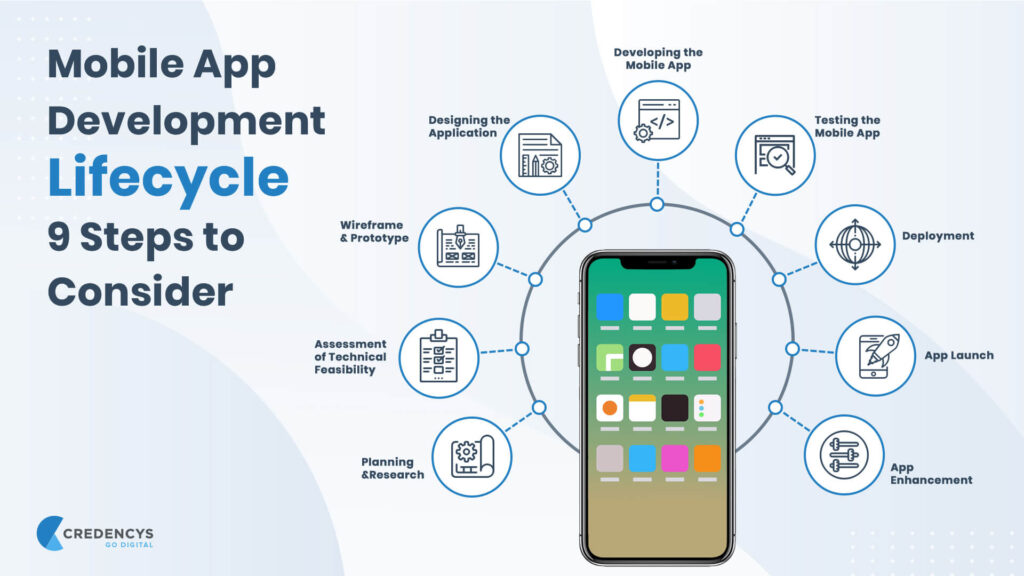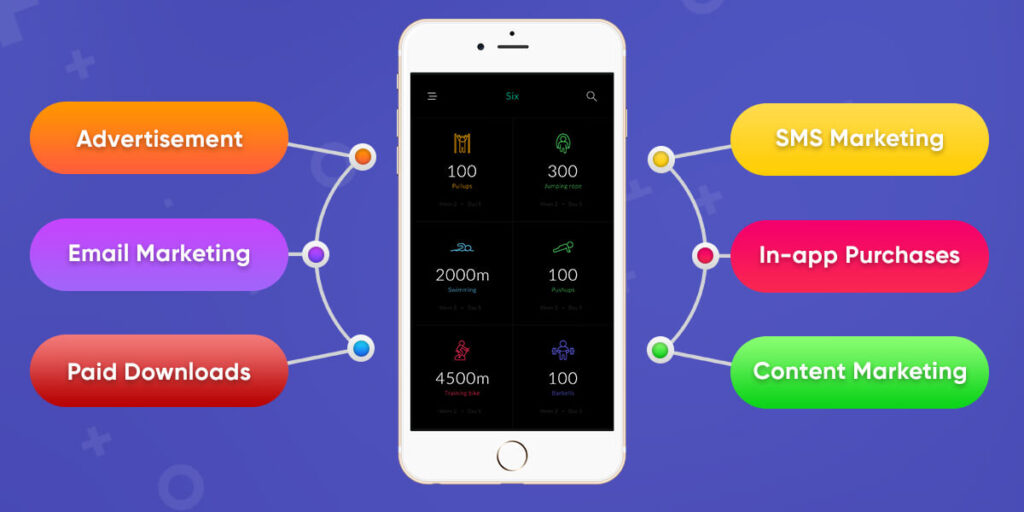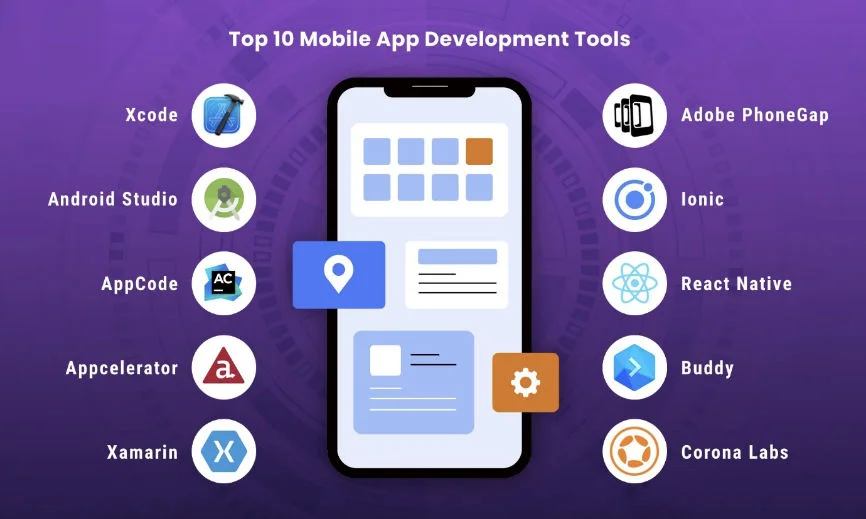MOBILE APPLICATION DEVELOPMENT
INTRODUCTION
Mobile app development has revolutionized how we interact with technology, profoundly shaping our daily lives. With smartphones and tablets now ubiquitous, mobile apps have become essential tools, offering a vast array of services and entertainment options at our fingertips. From communication and social networking to navigation, healthcare, and finance management, these apps enhance productivity and well-being. The evolution of mobile app development has been remarkable, starting from basic games to sophisticated, feature-rich applications that drive modern businesses and transform industries. Advancements in hardware, high-speed internet, and developer ingenuity have propelled this transformation, pushing the boundaries of what’s possible.
Today, mobile app development is a vibrant ecosystem marked by creativity, innovation, and intense competition. With thousands of new apps released daily, developers must adopt a holistic approach, focusing on user experience design, cutting-edge programming, and effective marketing to stand out in this dynamic landscape.

HISTORY OF MOBILE DEVELOPMENT
The history of mobile app development is relatively short but marked by exponential growth in both the number of apps and their utility. The journey began in 1992 when IBM created the first mobile app for the Simon Personal Communicator. However, it was the launch of the Apple App Store in 2008 that catalyzed a significant leap in mobile app development. Since then, the proliferation of apps has skyrocketed, becoming integral to our daily lives.
Initially, mobile apps were simple and often served singular purposes. However, with the advancement of smartphone capabilities, apps have become increasingly complex and multifaceted. Today, there’s an app for virtually every aspect of life, ranging from productivity tools to entertainment and gaming.
Several factors have fueled the growth of mobile app development, including the surge in smartphone popularity, widespread access to high-speed internet, and the continuous evolution of tools and technologies. Consequently, mobile app development has emerged as a major industry, with countless developers catering to a global audience.
Looking ahead, the future of mobile app development appears promising. As smartphones evolve and new technologies emerge, we anticipate witnessing even more innovative and groundbreaking apps that will shape our digital experiences in the years to come.
MONETIZATION STRATEGIES FOR MOBILE APPS
1. In-app purchases: This involves selling virtual goods or services within the app itself. This could include anything from extra levels in a game to additional features or customization options. In-app purchases can be a lucrative way to monetize an app, especially if it has a large and engaged user base.
2. Advertising: Displaying ads within the app is another common way to generate revenue. Ads can be placed in various locations within the app, such as between levels in a game or at the bottom of a news article. The amount of revenue generated from advertising will depend on the number of users who see the ads and the click-through rate.
3. Subscriptions: Offering a subscription service can provide a steady stream of revenue for app developers. Subscriptions can give users access to premium features or content within the app, such as ad-free streaming or exclusive articles. The success of a subscription model often depends on the perceived value of the content or features being offered.
4. Sponsorship: Partnering with a brand or company to sponsor the app can be another effective way to generate revenue. Sponsors can provide financial support in exchange for branding or product placement within the app. Sponsorship can be particularly beneficial for apps that have a large and engaged user base.
5. Data collection and analysis: Collecting and analyzing user data can be a valuable asset for app developers. This data can be used to improve the app, personalize the user experience, and target advertising more effectively. Some app developers may also choose to sell user data to third parties for market research or advertising purposes.

TOOLS AND TECHNOLOGIES FOR MOBILE APP DEVELOPMENT
1. Programming Languages:
The choice of programming language for mobile app development depends on the platform for which the app is being developed. For iOS apps, Swift is the primary programming language, while Java and Kotlin are the preferred choices for Android apps. Other programming languages, such as C++, C#, and JavaScript, can also be used for mobile app development, although they are not as widely adopted as Swift and Java.
2. Integrated Development Environments (IDEs):
IDEs provide a comprehensive set of tools for developing mobile apps, including code editors, debuggers, and build tools. Some popular IDEs for mobile app development include Xcode for iOS apps, Android Studio for Android apps, and Visual Studio for cross-platform apps.
3. Version Control Systems (VCS):
VCS allow developers to track changes to their code over time and collaborate with other developers. Some popular VCS for mobile app development include Git, Subversion, and Mercurial.
4. Cloud Platforms:
Cloud platforms provide a range of services for mobile app development, including storage, compute, and databases. Some popular cloud platforms for mobile app development include Amazon Web Services (AWS), Microsoft Azure, and Google Cloud Platform (GCP).
In addition to these essential tools and technologies, there are a number of other tools and services that can be used to enhance the mobile app development process, such as bug tracking systems, analytics platforms, and user testing tools. The choice of tools and technologies for mobile app development depends on the specific requirements of the app being developed.

CONCLUSION
The future of mobile app development is promising, fueled by the increasing demand for innovative solutions as smartphone usage continues to rise. Mobile apps have the potential to address real-world problems and positively impact lives. For those interested in entering the field, numerous resources are available to help get started.
As technology advances, the possibilities for mobile app development are boundless. Developers will continue to explore new avenues, leveraging emerging devices and platforms to create engaging and inventive apps that cater to user needs. The future is ripe with potential, making it an opportune time to delve into mobile app development.
Here are some key tips for aspiring developers:
• Learn the basics of programming: Familiarize yourself with programming fundamentals through available resources.
• Choose a platform: Decide between iOS and Android based on your target audience, skills, and interests.
• Get the right tools: Utilize tools like Xcode for iOS and Android Studio for Android development.
• Start building your app: Utilize tutorials, forums, and courses to begin crafting your app idea into reality.
• Test your app: Ensure thorough testing to verify functionality before release, utilizing services like TestFlight or Google Play Beta.
• Release your app: Submit your app for review on the App Store or Google Play and make it available for download to users.
Mobile app development is a challenging yet rewarding endeavor, ideal for those passionate about technology and eager to make a difference. With dedication and perseverance, aspiring developers can carve out a fulfilling career in this dynamic field.
